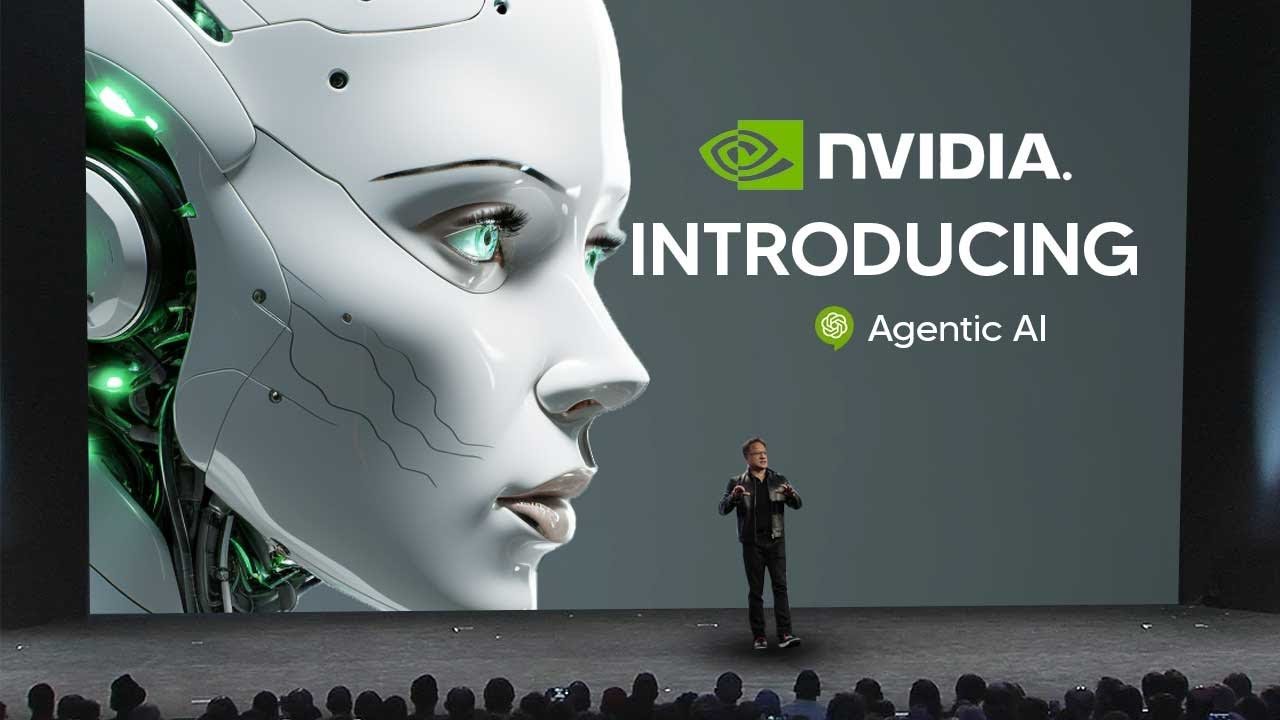You are about to explore the groundbreaking developments in artificial intelligence, spearheaded by Nvidia, that are set to transform various industries by 2025. Nvidia has outlined a future where AI agents, essentially digital AI workers, will significantly enhance domains such as marketing, customer support, and supply chain management. These AI agents are designed not to replace human roles but to work alongside humans, optimizing processes and improving overall workflow efficiency. The platform named Nemo plays a critical role by providing comprehensive tools for creating such AI agents through pre-trained models and microservices.
Collaborations with global companies like ServiceNow, SAP, and Snowflake signal a unified drive to incorporate these advanced AI capabilities into business services. Moreover, Nvidia’s efforts hint at an emerging trend towards developing personal AI agents, envisioned as companions that assist individual users throughout their lives. The evolution of AI agents is further highlighted by industry leaders like Mustafa Suleyman at Microsoft, who focuses on creating conversational AI companions. These endeavors mark a pivotal shift towards an integrated AI ecosystem where digital agents become indispensable assets in both professional and personal spheres by 2025.

This image is property of i.ytimg.com.
Overview of Nvidia’s Vision for AI Agents by 2025
Introduction to AI Agents as Digital Workers
You are entering an era where AI agents, envisioned as the next generation of digital workers, are set to redefine how businesses operate by 2025. Nvidia has positioned itself at the forefront of this transformation, forecasting that AI agents will function as digital employees. These agents possess the ability to understand, plan, and take action, significantly aiding sectors such as marketing, customer support, supply chain management, and software development. These AI agents are akin to tireless assistants adept at executing specific tasks efficiently.
Projected Impact on Different Industries
The projected impact of AI agents spans various industries, disrupting traditional business models and creating new opportunities for growth. In marketing, AI agents can automate and optimize campaign delivery, ensuring that the right message reaches the appropriate audience with unparalleled precision. Customer support processes are also set to become more responsive and personalized, offering customers real-time assistance while significantly reducing wait times. In logistics and supply chain management, AI agents promise to enhance efficiencies by predicting demands, managing inventories, and optimizing delivery routes. The software development landscape is also shifting as agents take on repetitive coding tasks, enabling human developers to focus on more creative and complex problems.
Understanding AI Agents: Capabilities and Functions
Role in Marketing and Customer Support
As AI agents take on roles in marketing, you will see a transformation in how customer engagement and outreach are managed. These agents can process vast amounts of data to identify trends, preferences, and opportunities for targeted campaigns. In customer support, AI agents are capable of understanding natural language queries to provide quick and accurate responses. By handling routine inquiries and troubleshooting, they empower human agents to concentrate on more nuanced customer interactions.
Enhancements in Supply Chain Management
In supply chain management, AI agents excel at streamlining operations through enhanced decision-making capabilities. These digital assets utilize predictive analytics to manage demand forecasting and inventory control. You can expect AI agents to identify bottlenecks and propose solutions, drastically reducing waste and improving efficiency in logistics. Their ability to adapt to unforeseen changes ensures a resilient supply chain that contributes to cost savings and operational efficiency.
Implications for Software Development
Within the realm of software development, AI agents are poised to augment productivity by taking over repetitive and mundane coding tasks. You will find that these agents can write code snippets, identify and fix bugs, and even conduct preliminary quality assurance checks. This automation allows software developers to focus on innovation and problem-solving, driving faster development cycles and enhancing software quality. The presence of AI agents ensures a streamlined workflow, minimizing human error and expediting project timelines.
Nvidia’s Nemo Platform
Tools for Data Curation and Training
Nvidia’s Nemo platform is a comprehensive suite of tools designed to aid in the creation and refinement of AI agents. Central to its capabilities is the focus on data curation and training, providing you with the means to collect, clean, and prepare data for AI model training. The platform ensures that the data is not only accurately labeled and relevant but also comprehensive enough to train robust AI models capable of sophisticated tasks.
Libraries for Fine-Tuning AI Agents
In addition to data handling, the Nemo platform offers libraries specifically tailored for fine-tuning AI agents. You are provided with the frameworks necessary to customize pre-trained models to meet specific business requirements. These libraries support various stages of AI model development, from initial training to deployment, ensuring that the AI agents perform optimally within their designated functions. This accessibility to fine-tuning tools enhances the flexibility and adaptability of AI agents across different applications.
The Technology Behind AI Agents
System of AI Models vs. Single Model Approach
At the core of Nvidia’s strategy lies a sophisticated system of AI models, as opposed to relying on a single-model approach. You will appreciate the versatility and robustness that a multi-model system offers, as it enables AI agents to perform a variety of tasks with greater accuracy and reliability. This system comprises multiple specialized models that work cohesively, addressing complex problems through collaboration and context integration.
Utilization of Pre-Trained AI Models (Nims)
Nvidia introduces pre-trained AI models, encapsulated as Nims, which serve as foundational elements in AI agent development. These models are pre-configured to perform specific tasks, allowing you to leverage high-quality AI responses without starting from scratch. By utilizing Nims, developers can build AI applications faster and with less resource investment, ensuring that AI agents are both cost-effective and reliable.

Deployment and Integration of AI Agents
Microservices for Easy Deployment
AI agents are designed for seamless deployment through the use of microservices architecture. This modular approach allows you to deploy agents as independent components or services that communicate with each other via APIs, promoting scalability and flexibility in enterprise environments. The microservices strategy simplifies the integration of AI capabilities into existing business infrastructures.
Collaborations with Global Companies
Nvidia is actively forging partnerships with global companies such as ServiceNow, SAP, and Snowflake to facilitate the adoption and integration of AI agents into their ecosystems. Collaborating with these leading organizations, you can expect an enhanced portfolio of AI-driven solutions that improve productivity and operational efficiencies across various sectors. These collaborations aim to drive innovation and provide businesses with the tools required to stay competitive in a rapidly evolving market landscape.
Transformative Potential of AI Agents in Enterprises
Optimizing Business Processes
AI agents possess the potential to transform how enterprises optimize internal business processes. By automating routine tasks and providing real-time analytics, these agents can significantly reduce operational costs and increase service efficiency. Your business can benefit from streamlined workflows and improved decision-making capabilities driven by AI-powered insights.
Providing Insights and Improving Workflow Efficiency
The ability of AI agents to analyze data and surface actionable insights is a game-changer for workflow efficiency. They empower decision-makers with precise information and recommendations, supporting strategic planning and agile responses to market changes. As these agents continue to evolve, you will notice their improved capability to process complex datasets quickly, thus enhancing the overall agility and competitiveness of organizations.

Personal AI Agents: A New Frontier
Definition and Purpose
Personal AI agents are emerging as a revolutionary concept, designed to serve as lifelong digital companions tailored to individual needs. These agents are envisioned to provide personalized assistance, facilitating daily routines from planning trips to managing personal finances. They aim to offer an additional layer of convenience and personalization, seamlessly integrating into daily life.
Capabilities as Lifelong Companions
As lifelong companions, personal AI agents learn and grow alongside their users, adapting to changing preferences and needs over time. You are entering an age where these agents will understand your habits, anticipate your requirements, and provide recommendations tailored to your lifestyle. They promise to enhance not only task management but also enrich user experiences by providing companionship and support.
Advancements in AI Technology for Personal Agents
Learning and Evolving with Users
AI technology advancements pave the way for personal agents that can continuously learn and evolve with their users. They employ machine learning algorithms to analyze user interactions and preferences, becoming more personalized and effective over time. This evolution ensures that personal AI agents deliver increasingly relevant and intuitive assistance.
Enhancing Personal Tasks and Interactions
The capabilities of personal AI agents extend to enhancing personal tasks and interactions. These agents can schedule appointments, manage emails, remind you of important dates, and even engage in conversations, effectively bridging the gap between digital and human interactions. Their potential to transform how individuals manage their daily tasks is immense, offering a future where routine activities are simplified and streamlined.
Future Collaborations and Developments
Partnerships with ServiceNow, SAP, and Snowflake
Nvidia’s strategic partnerships with enterprises like ServiceNow, SAP, and Snowflake are pivotal for the broader integration and acceptance of AI agents. Through these alliances, you can access AI-driven solutions designed to enhance operational capabilities and set new benchmarks for industry standards. These partnerships are instrumental in bringing innovative AI applications to the forefront of modern business practices.
Initiatives by Mustafa Suleyman & AI Co-Pilots at Microsoft
Industry leaders like Mustafa Suleyman at Microsoft are spearheading initiatives to develop AI co-pilots that complement human efforts across various platforms. These AI co-pilots are expected to be conversational companions, facilitating more interactive and efficient collaborations between humans and machines. Their development signifies an important step in realizing the symbiosis between AI technology and human activities, paving the way for more intricate and collaborative AI solutions.
Concluding Thoughts on AI Agents in 2025
Reflecting on the Balance Between AI and Human Roles
As AI agents evolve by 2025, it becomes crucial to reflect on the balance between AI and human roles. While AI has the capability to handle numerous tasks effectively, it is essential to ensure that these agents complement rather than replace human intellect and creativity. By achieving a harmonious balance, you can leverage AI’s full potential to enhance productivity and innovation.
Potential Challenges and Ethical Considerations
Despite the promise AI agents hold, potential challenges and ethical considerations remain. Issues such as data privacy, security, and the ethical programming of AI agents are paramount. It is essential to address these concerns responsibly to foster trust and acceptance of AI technology. As you navigate the future of AI, it will be critical to ensure that the deployment and utilization of AI agents prioritize ethical standards and human welfare.